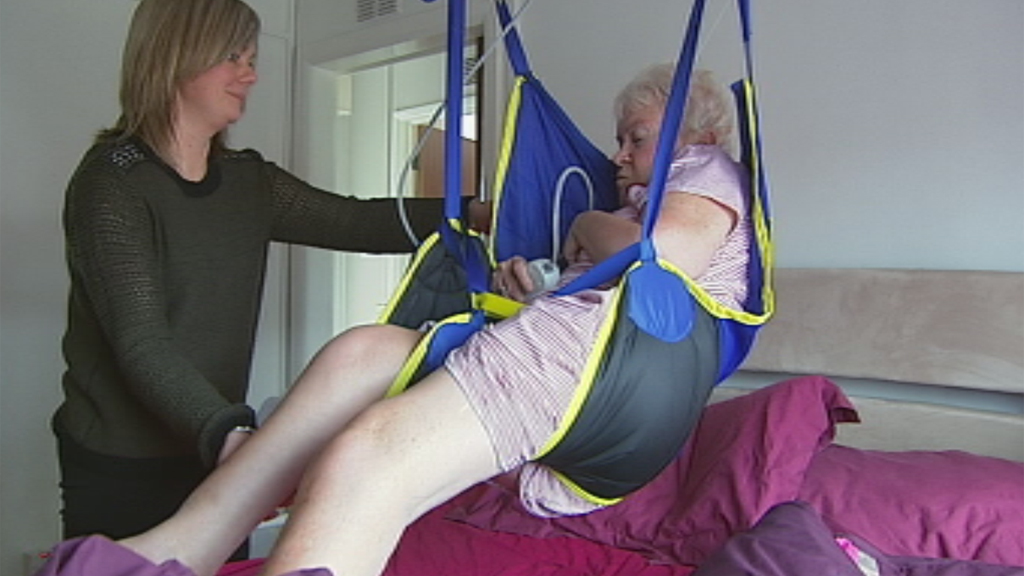Disabled living fund changes challenged at high court
Five disabled people are challenging a plan to change the way their care is funded by the government, arguing it undermines the state’s duty to promote independent living for the disabled.
<!–
–>

The ILF is a £320m fund that helps around 19,000 people with severe disabilities to live independently, and these five men and women – on behalf of thousands of others – are challenging the Government’s decision to scrap it from 2015 and devolve it to local authorities instead.
One of the claimants is 73-year old Anne Pridmore (pictured), who has cerebral palsy and needs 24 hour care.
I’ve lived in this house for 47 years and didn’t expect to have to campaign to stay in my own home at my age Anne Pridmore
She has a rota of personal assistants who help her with everything from getting up, to eating, to going out – and to the loo. At the moment, half of that is paid for by the ILF, the rest by the Local Authority.
She told Channel 4 News: “It’s like the sword of Damocles hanging over my shoulder because it’s always on your mind: what’s going to happen? Many of us feel the same way. If the local authority won’t take over the funding to pay for the bit the ILF have been paying, I see the only option is being put into an old people’s home. I’ve lived in this house for 47 years and didn’t expect to have to campaign to stay in my own home at my age.”
Mrs Pridmore has met representatives from her local council to ask what their plans are.
“I pressed them but they were very cagey, and talked about other ways of providing care which doesn’t involve “hands on” care. I believe they are probably referring to things like people having to use incontinence pads. They are not doing that yet in my local authority but I know that people who have to use these in other areas.”
Lawyers for the six told us they are challenging the Government decision on two grounds.
They say the Government is breaching the UN Convention on the Rights of People with Disabilities, to which it is a signatory and which includes promises to promote independent living.
They also argue the consultation process carried out before the scheme was axed was “unlawful” because it didn’t provide adequate information on the differences between the fund and the local authority assessment and provision. They also say there hasn’t been proper assessment of the impact of the change on disabled people’s ability to live and work indepdently.
Today the Department for Work and Pensions told us:
“How disabled people are supported to live independent lives has changed fundamentally over the past 20 years including through the introduction of person budgets.
“The ILF was closed to new users in 2010 and we are now devolving funding to local authorities to ensure the remaining users have their needs met in a single cohesive system.
“Nearly 1.6 million disabled people across the UK already receive support through local authority and devolved administrations social care arrangements.”
Shortage of funds
Charities for disabled people argue that local authorities won’t, and already don’t have the money to support people.
A recent report from Scope pointed to local authority underfunding. It said 4 in 10 disabled people are already failing to have their basic needs met.
Research by the Personal Social Services Research Unit (PSSRU) has concluded that under proposed government reforms, including the axing of the ILF, at least 105,000 working age disabled people are set to miss out on essential care and support.
This finding is disputed by the DWP.
-
Latest news
-
‘Government responsiveness should be improved’ says infected blood inquiry chair4m

-
Infected Blood scandal: How UK failed on a global scale4m

-
‘There’s a strong evidential basis’ for ICC to grant arrest warrants for Netanyahu, says criminal law expert4m

-
International Criminal Court prosecutor seeks arrest warrants for Israel PM and Hamas leaders3m

-
‘Highly unlikely there was foul play’ in Iran president helicopter crash, says Tehran professor5m

-




